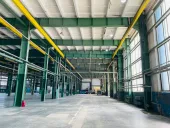Samsung C&T takes 15 pct stake in $4.8 bln CCS project
Samsung Construction & Trading has taken a 15 percent stake in a $4.8 billion power station and carbon capture and storage project in Britain
owned by 2Co Energy, the companies said in a statement on Wednesday.
The carbon project is part of a 650-megawatt coal-fired power plant in Don Valley, South Yorkshire, and will capture at least 90 percent of the
power station's carbon dioxide emissions, the statement said.
The financial terms of the deal were not disclosed.
Carbon capture and storage (CCS) involves trapping carbon dioxide otherwise emitted by fossil fuel power plants, and piping it underground for
long-term storage in spent oil fields or aquifers.
It is however, still commercially unproven but is widely seen as a key mechanism to fight climate change while maintaining the use of
traditional energy supplies.
A spokeswoman said Samsung C&T was taking a 15 percent stake in 2Co Power (Yorkshire) Ltd, a wholly owned subsidiary of 2Co Energy Ltd, which
is developing and raising the capital for the power plant portion of the project.
2Co Energy's project received a 180 million euro grant from the European Commission in 2009, the same year it was granted planning permission.
A final investment decision is expected by mid-2013, with completion in 2016, the statement said.
The plant will capture about five million tonnes of carbon dioxide a year, using the gas to recover about 150 million barrels of oil under the
North Sea before the CO2 is permanently stored in the oil fields, the statement added.
Samsung C&T will carry out the engineering, procurement and construction contract for the onshore part of the project. Total investment in the
onshore and offshore portions was estimated to be nearly five billion pounds ($8 billion), the statement said.
Britain aims to become a world leader in clean technology, but its efforts suffered a blow in October, when its flagship Longannet CCS project
failed to secure government funding after costs rose above expectations.
Analysts say CCS technology is critical if Britain wants to reach its long-term target of reducing emissions by 80-95 percent by 2050, and that
opting out of CCS would require costly alternatives.



















 Advertise
Advertise







